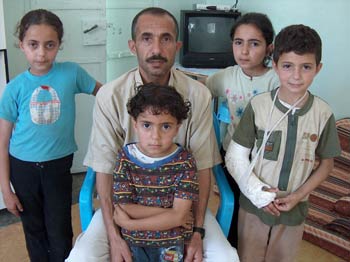July 2006, Joint report with Hamoked - Center for the Defence of the Individual, Summary
For more than five and a half years, Israel has prevented family unification between Palestinian residents of the Occupied Territories and their spouses from abroad. Israel also prohibits the foreign family members from visiting the West Bank or the Gaza Strip. Since the beginning of the second intifada, Palestinians have submitted more than 120,000 requests for family unification, which Israel has refused to process. Only in rare instances, which Israel deems "exceptional humanitarian cases," have state authorities processed the requests.
The freeze on processing family unification requests has created a harsh reality for tens of thousands of Palestinian families: spouses are unable to live under the same roof; children are forced to grow up in single-parent families though their parents want to live together; people do not leave the Occupied Territories to go abroad for medical treatment because Israel will not issue them a new visitor's permit; tens of thousands of women live in the Occupied Territories with no legal status and thus face the constant threat of deportation, become prisoners in their homes, and are unable to live a normal life.

Muhammad al-'Amleh with his children, separated from the mother for four years. Photo: Musa Abu Hashhash, B'Tselem, 8 June 2006.
The freeze policy severely infringes Palestinians' human rights, breaching their right to marry and found a family, among other things. Denial of family rights also harms the social, economic, and emotional lives of all family members. The longer the freeze continues, the greater the harm.
Israel imposed the new policy in October 2000, several days after the outbreak of the second intifada. Israel contends that the freeze resulted from the intifada and the security situation. Israel never explained how the policy is related to the uprising in the Occupied Territories or how the policy serves its security needs. There is no question that Israel is entitled to take its security needs into account when it sets policy in the Occupied Territories . But these needs do not grant it the right to trample on the human rights of Palestinians, who live under complete Israeli control.
There are reasons to believe that the freeze policy is based on extraneous, improper considerations. The policy completely bars immigration into the Occupied Territories , and even encourages residents to leave the area and live with their spouse and children abroad. At the same time, Israel allows the unfettered immigration of Israelis into the West Bank . A policy aimed at changing the demographics of occupied territory is forbidden. This practice constitutes racial discrimination, which must be eliminated wherever it appears. It also appears that Israel instituted the policy for use as a "bargaining chip" in future negotiations with the Palestinian Authority over the right of return.
The freeze policy is arbitrary. Indeed, in most cases where a family petitions the High Court of Justice, the state withdraws its refusal and grants a visitor's permit to enter the West Bank . In addition, the sweeping nature of the policy raises the concern that it was intended to punish the Palestinian population for initiating the uprising. In general, Israel conditions renewal of the processing of family unification requests on the absence of Palestinian rebellion against it. Collective punishment is absolutely forbidden under international humanitarian law.
HaMoked and B'Tselem call on the government of Israel to begin immediately to process requests for family unification and visitor's permits to enable Palestinians to exercise their right to live as a family in the Occupied Territories within a reasonable period of time. Israel must ignore political and demographic considerations, and weigh only its security needs, while fully respecting all human rights involved.